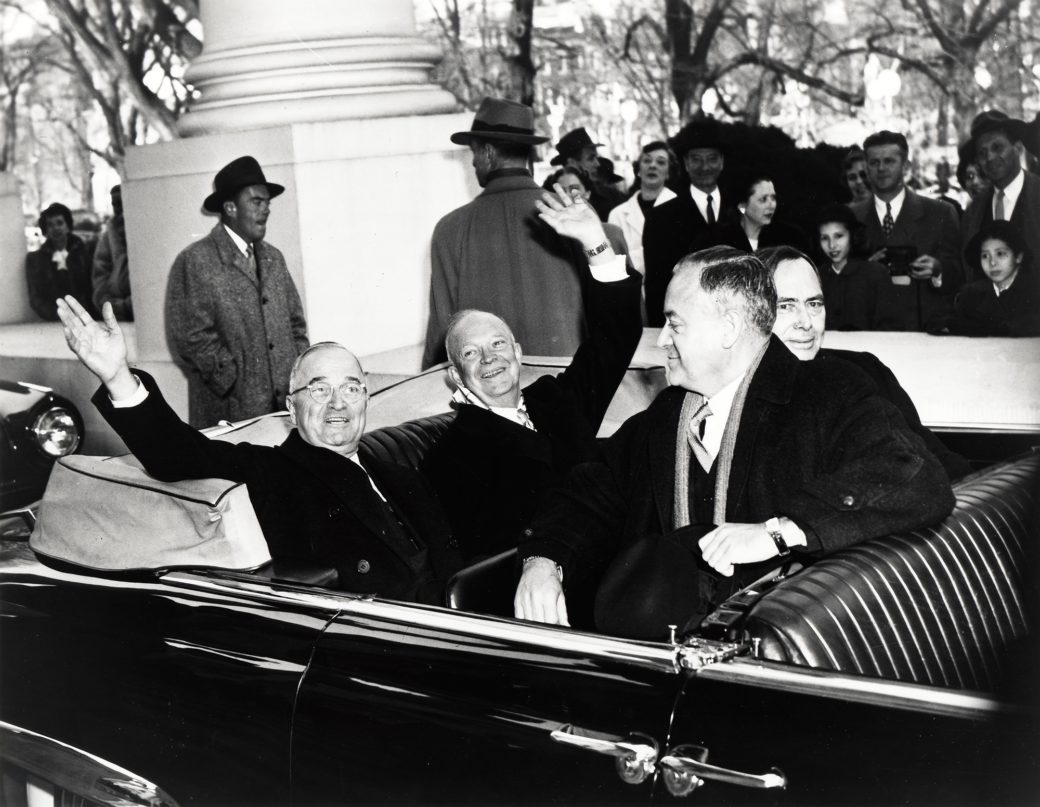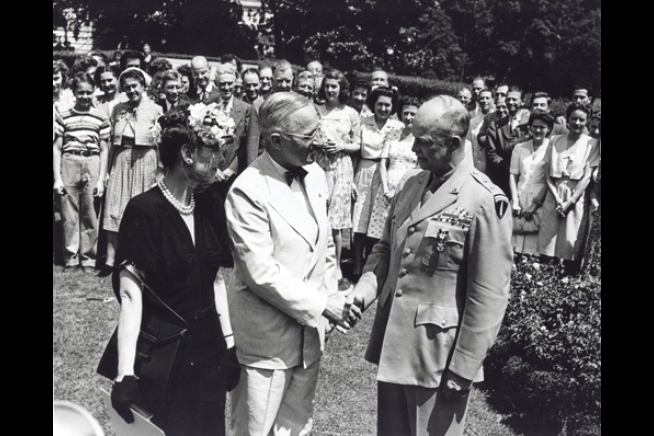
Ike and Truman car ride to the Capitol on Inauguration Day, January 20, 1953 (Library of Congress)
It is a routine yet special occurrence in American history—one political leader handing over the most powerful office in the land—the Presidency of the United States—to another. In some cases, this transfer is done amongst friends and political allies. In others, it is amongst political rivals. On January 20, 1953, such a transfer of power occurred, when President Harry Truman passed the torch of leadership to incoming President Dwight D. Eisenhower. These two men were giant figures of the 20th Century, yet their relationship that day was deeply strained. As they were photographed together in the backseat of a car, their facial expressions feigned excitement and hid the frustration--even acrimony--each felt toward the other. Regardless, they rode together to the Capitol, intent on participating in one of the oldest and grandest of American traditions—the presidential inauguration.
Harry S. Truman and Dwight D. Eisenhower took vastly different roads to that moment on January 20, 1953. Truman grew up on a farm in Missouri and served in the United States Army during World War I, even seeing combat in France. After the war, he resumed his farm life, eventually running a haberdashery story before getting into local and state politics. By the 1930s, he was a United States Senator from Missouri. During World War II, he distinguished himself on the Committee on Military Affairs, where he used his position to investigate wasteful spending and corruption in wartime government contracts. By 1944, Truman was prominent yet acceptable enough that he replaced Henry Wallace in running for Vice President on the Democratic Ticket. Roosevelt’s winning of an unprecedented fourth term, thus meant that Truman had gone from a county judge to the Vice Presidency in just over a decade. Within months, Roosevelt died of an aneurism and Truman found himself the 33rd President of the United States. His presidency proved to be a hugely consequential one, as he confronted decisions on the use of atomic weapons and how to shape the post-war world both at home and abroad.
The man taking his place on that stage was about to enter the first elected office of his lifetime. Like Truman, Eisenhower was from the central United States—born in Texas and growing up in Kansas. His path to power was much different though. Ike’s journey took him through West Point, then several decades worth of army postings both in the United States and abroad. While Truman was in France during the Great War, Ike was in his future home of Gettysburg, Pennsylvania, running a tank training camp. While Truman was getting experience in the Senate, Ike was in the Philippines, serving as a staff officer for General Douglas MacArthur. For each, it was World War II that elevated them to power. While Truman was on the Committee on Military Affairs, Eisenhower was gaining stars on his epaulettes, rising from a Brevet Brigadier General at the war’s outset to gaining his 5-star ranking by December 1944. By May 1945—when Truman was adjusting to the presidency—Eisenhower was one of the most respected and well-known figures on earth.

President Harry S. Truman and General Dwight Eisenhower Shake Hands in 1945 (National Archives)
Naturally, following World War II, Eisenhower was a sought-after figure for both political parties. In the post-war years, though, he initially shrugged off the pleas of politicians, serving as General of the Army for several years before leaving to be the president of Columbia University. During these post-war years, he and Truman had a good working relationship, with Truman as Commander-in-Chief, and Eisenhower as his top general. Truman awarded Eisenhower the Distinguished Service Medal on three separate occasions during this time span—1945, 1948, and 1952 (Ike had received two previously, in 1922 and 1943). By 1951, Truman called on Eisenhower to take the role of Supreme Commander of NATO forces, pulling him back into public life.Indeed, their relationship was strong enough that in 1947 Truman had even offered to step aside and allow Ike to run atop the Democratic ticket in 1948—with Truman running as his Vice President. Eisenhower rebuffed the offer, however, saying he had no interest in politics at that time. Truman had hoped Eisenhower would continue the Democratic lease on the White House that FDR had begun in 1932, and which had been unbroken in the twenty years since. Eisenhower turning Truman down, only to end up changing his mind on politics and running as a Republican in 1952, was the beginning of their falling out.
The 1952 presidential campaign only made their relationship worse. Though it was Illinois Governor Adlai Stevenson atop the Democratic ticket, Harry Truman, as the incumbent president, still weighed into the political fray, taking part in typical partisan attacks on Eisenhower and fulfilling his role as a party leader in support of Stevenson. While Eisenhower and the Republicans had attacked his administration for being “soft on communism,” Truman and the Democrats focused on Ike’s lack of political experience, among other issues. In one verbal salvo, Truman said of Eisenhower, “the General doesn’t know any more about politics than a pig knows about Sunday.” While such turns of phrase were common in presidential politics, Eisenhower wasn’t used to such barbs, and did not appreciate the president’s partisan attacks.One particular area of Democratic attack was regarding Wisconsin Republican Senator Joseph McCarthy, who flung wild allegations of communism far and wide. Among those whom McCarthy targeted was General George Marshall, who Truman had chosen to serve as first Secretary of State and then Secretary of Defense in his administration. Eisenhower had failed to condemn McCarthy for these attacks against Marshall, causing Truman to accuse him of “moral blindness.” This did not sit well with Ike, who owed much of his success during World War II to Marshall and his advocating promotions and opportunities for him in the early months of the conflict. Eisenhower took Truman’s attacks personally, so much so that, according to Emmet John Hughes, one of Eisenhower’s speech writers, the “mere mention of Harry Truman’s name brought fast flashes of antipathy” in the former Supreme Allied Commander. Eisenhower’s massive electoral college victory in November 1952 did not help his relationship with Truman.
Eisenhower and Truman met just once following the election—a brief visit at the White House on November 18, where the outgoing president tried to provide advice for his successor on White House staffing and world affairs, of which Ike himself noted, it “added little to my knowledge, nor did it affect my planning for the new administration.”
Thus it was that Inauguration Day—January 20, 1953—was a cold and frosty affair, in more ways than one. When Eisenhower arrived at the White House, he refused an invitation to come inside and have a cup of coffee with the president; he instead waited on him to come outside and join him in the car for the ride to the Capitol. While they were photographed both smiling together in the back seat, the two men were anything but happy to be together.The ride down Pennsylvania Avenue was chilled and quiet. Truman recalled Eisenhower breaking the silence by telling him, “I did not attend your Inauguration in 1948 out of consideration for you, because if I had been present I would have drawn attention away from you,” to which the outgoing president responded, “Ike, I didn’t ask you to come—or you’d been here.” While Eisenhower later said no such conversation occurred, he did remember asking Truman who had ordered his son John, an Army officer who was then stationed in Korea, to be in Washington for the ceremonies. Truman said that he had ordered it personally, noting, “The President thought it was right and proper for your son to witness the swearing in of his father to the Presidency.” Several days later, President Eisenhower wrote to former President Truman to thank him for his help in the transition process, as well as for seeing to it that John was present in Washington for the Inauguration. That was to be their last communication for six years.
Like so many strained relationships, it was the loss of mutual friends that would bring Ike and Truman back together in the end. In 1959, George Marshall died. At a brief funeral for Marshall in Virginia, President Eisenhower and former President Truman sat side by side in the first pew, their first time together since Inauguration Day, 1953.Four years later, it was again a shared grief that brought them together, this time in the wake of President Kennedy’s assassination. In November 1963, Eisenhower and Truman shared a car ride once again, this time taking them to Arlington National Cemetery for a graveside service for the slain president. After the service, they rode together to Blair House, where Truman was staying. There, a decade after Ike rejected Truman’s invitation for coffee at the White House, the two leaders finally did have their cup of coffee, along with some sandwiches and pleasant conversation. Bess Truman had been too ill to make the trip to Washington, so Harry was joined by his daughter, Margaret, instead. Harry and Margaret entertained Ike and Mamie over sandwiches, coffee, and reminiscing conversation for over an hour that day, breaking through the years of tension that had built up between the 33rd and 34th presidents. Admiral Ronald Dennison a White House aid who witnessed the meeting, noted, “it was really heart-warming. You’d think there had never been any differences between them. It was really wonderful.”
At the end of the visit, Truman and Eisenhower had a long handshake. Then, they parted ways, never to see each other again.
|
January 05, 2021
|
Last updated: January 5, 2021
